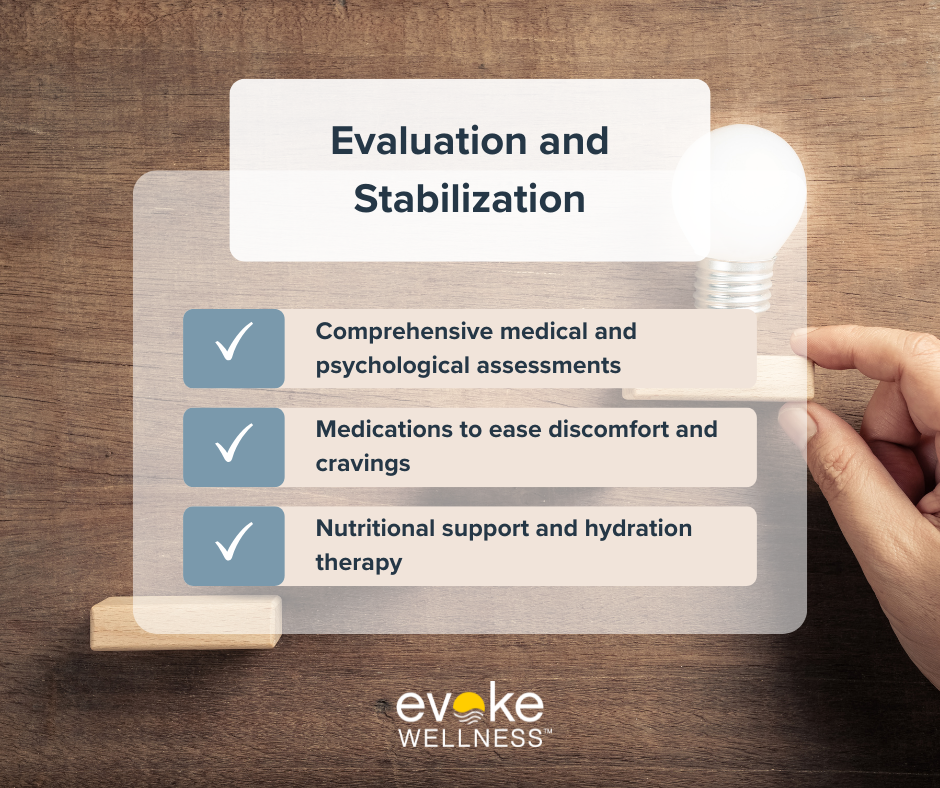Embarking on the journey of addiction recovery can be daunting, but understanding the stages of detox can empower you to take that crucial first step. As you consider treatment options, it’s essential to know what lies ahead. Recent studies show that medically supervised detox significantly improves outcomes, with success rates up to 68% higher than unsupervised attempts. This article will guide you through each phase of the detoxification process, from medical detox to residential treatment and dual diagnosis care. By familiarizing yourself with these stages, you’ll be better prepared to navigate the challenges and embrace the transformative potential of recovery. Let’s explore what you can expect at each step of this life-changing process.
Together, let’s embrace the journey to recovery and the promise of a new beginning. Call us at (833) 503-0734 today or reach out online.
What is Detoxification?
Detoxification, often referred to as detox, is the crucial first step in the addiction recovery process. It involves ridding the body of toxic substances like alcohol or drugs under medical supervision. This phase aims to safely manage the physical and psychological symptoms that arise during withdrawal.
Safe and Comfortable Withdrawal
During detox, individuals receive 24/7 care and monitoring from healthcare professionals. Medications may be prescribed to alleviate intense cravings and uncomfortable withdrawal symptoms like nausea, tremors, and anxiety. According to research, this medically supervised approach significantly improves treatment outcomes and reduces relapse risks.
Holistic Therapies for Healing
In addition to medication-assisted treatment, holistic practices like meditation, yoga, and nutritional counseling play a vital role. These complementary approaches help restore mind-body balance and promote overall well-being during the detox phase. They prepare individuals for the next stage – comprehensive addiction treatment.
Transitioning to Comprehensive Care
After detox, individuals transition into residential or outpatient programs tailored to their needs. Evidence-based therapies like cognitive-behavioral therapy (CBT), dialectical behavior therapy (DBT), and trauma-focused interventions address the root causes of addiction. Dual diagnosis treatment is available for those with co-occurring mental health disorders.
Detoxification is the critical first step towards lasting recovery. By managing withdrawal safely and holistically, individuals can progress to comprehensive addiction treatment programs with a strong foundation for lasting change.
The Initial Steps of Detox
The Importance of Medical Detox
The initial step of detox involves entering a medical detox program under 24/7 professional supervision. This critical phase carefully manages withdrawal symptoms as substances leave the body. Medical detox ensures a safe, comfortable environment while easing unpleasant side effects like nausea, anxiety, and cravings.
Evoke Wellness at San Marcos offers personalized detox plans with round-the-clock clinical care. Their staff provides medication-assisted treatments and emotional support throughout the process. This holistic approach addresses both the physical and psychological aspects of addiction.
Preparing for Detox
Before detox begins, patients undergo a comprehensive intake assessment. This confidential evaluation gathers details on substance use history, medical background, and treatment goals. Insurance benefits are also verified to determine coverage.
Having all essential information allows Evoke’s team to tailor an effective detox protocol. Patients are then prepared for admission with guidance on what to expect during their stay.
Continuing the Recovery Journey
While detox rids the body of substances, it is only the first step. After stabilizing, many transition to Evoke’s residential treatment program. This substance-free haven provides a multifaceted approach combining evidence-based therapies like CBT and DBT.
Integrated care addresses the root causes driving addiction. Patients develop relapse prevention strategies through individual/group counseling and holistic practices. This comprehensive treatment sets the foundation for lasting sobriety.
Physical and Psychological Aspects of Detox
Withdrawal Symptoms
Detox is the crucial first step in overcoming substance addiction, but it often comes with uncomfortable physical and psychological withdrawal effects. These can include intense cravings, nausea, muscle aches, anxiety, depression, and insomnia. The specific symptoms and their severity depend on factors like the type of substance(s) used, dosage levels, and individual physiology. According to Stanford University, opioid withdrawal can begin as early as a few hours after the last dose and may persist for weeks or months without proper treatment.
Medical Monitoring
Attempting detox alone can be extremely dangerous due to the risk of severe, even life-threatening complications. Proper medical detox under 24/7 professional supervision is vital to ensure safety and manage withdrawal effects through medication, nutritional support, and constant monitoring of vital signs. As noted by Evoke Wellness, comprehensive, personalized detox treatment in a professional setting is crucial for a safe, effective process that paves the way for sustained recovery.
Psychological Support
Beyond the physical aspects, detox also requires addressing the significant psychological impact of addiction. Counseling, therapy, peer support groups, and holistic practices like meditation can provide essential emotional support and coping strategies during this challenging time. According to Evoke Wellness, celebrating even small milestones reinforces an individual’s strength and determination throughout the detox journey.
While detox alone is not treatment, it is the essential first step toward overcoming addiction’s physical and psychological hold. A full continuum of evidence-based care, including residential treatment and therapy, is recommended for lasting recovery after completing this initial phase.
Medically Assisted Detox: What It Involves
Medically assisted detox provides a safe, supervised environment for overcoming physical dependence on substances like alcohol, opioids, or benzodiazepines. During this first stage of treatment, you’ll receive 24/7 medical monitoring and support to manage withdrawal symptoms.
Withdrawal Management
Withdrawal symptoms can range from mild to potentially life-threatening. Medical staff will closely monitor your vital signs and adjust interventions as needed to keep you stable.
Transition to Treatment
Once stabilized, you’ll seamlessly transition into a comprehensive addiction treatment program. This may involve residential rehab, intensive outpatient care, counseling, and other evidence-based therapies.
Medically supervised detox addresses the physical aspects of addiction, increasing your safety and comfort. However, it’s just the first step toward lasting recovery, which requires further behavioral therapies and support systems.
Inpatient Detox vs. Outpatient Detox: Making the Right Choice
Assessing Your Needs
When embarking on the path to recovery from substance abuse, one crucial decision is whether to undergo inpatient or outpatient detox. This choice should be guided by a thorough assessment of your unique circumstances, including the severity of your addiction, the presence of co-occurring mental health issues, and the potential for withdrawal complications. According to a study published in the Journal of Substance Abuse Treatment, individuals with severe substance use disorders and complex medical or psychiatric conditions are more likely to benefit from inpatient detox programs.
Inpatient Detox: A Controlled Environment
Inpatient detox programs provide a safe, controlled environment where you can undergo the detoxification process under 24/7 medical supervision. This level of care is essential for those at risk of experiencing severe or life-threatening withdrawal symptoms, as well as those with co-occurring mental health disorders that require specialized treatment. According to the National Institute on Drug Abuse, inpatient detox facilities offer round-the-clock monitoring, medication management, and a structured environment that minimizes triggers and promotes a successful transition to the next phase of treatment.
Outpatient Detox: Flexibility and Support
For those with milder addictions or a strong support system at home, outpatient detox can be a viable option. This approach allows you to continue with your daily responsibilities while receiving regular check-ins and treatment from medical professionals. A study published in the Journal of Substance Abuse Treatment found that outpatient detox can be effective for individuals with less severe substance use disorders and a stable living environment. However, it’s crucial to have a reliable support system and the ability to consistently attend treatment sessions.
Making an Informed Decision
Ultimately, the decision between inpatient and outpatient detox should be guided by a thorough evaluation by medical professionals and a deep understanding of your unique needs and circumstances. According to the Substance Abuse and Mental Health Services Administration, factors such as the type and severity of the addiction, the presence of co-occurring disorders, the risk of withdrawal complications, and the availability of a supportive home environment should all be taken into consideration. By weighing these factors and seeking professional guidance, you can make an informed decision that sets you on the path to a successful recovery.
Emotional Support and Counseling During Detox
Detox is a critical first step on the path to recovery, but it can be an emotionally and physically demanding process. While medical supervision helps manage the physical withdrawal symptoms, comprehensive emotional support and counseling are equally vital during this phase.
Therapeutic Approaches
Through individual and group therapy sessions, evidence-based approaches like cognitive-behavioral therapy (CBT) and dialectical behavior therapy (DBT) equip individuals with coping strategies and tools to understand addiction triggers and develop healthy thought patterns. Family therapy programs also play a crucial role by involving loved ones, promoting healing, and strengthening support systems.
Holistic Healing
Complementing traditional therapies, holistic practices like meditation, yoga, art therapy, and mindfulness techniques foster overall well-being and provide healthy outlets for self-expression during this challenging transition. These activities promote stress relief, emotional regulation, and a sense of grounding – essential components for long-term recovery success.
Addressing Underlying Issues
For many, substance abuse is often a coping mechanism for underlying mental health conditions or past traumas. Trauma-informed care, such as Eye Movement Desensitization and Reprocessing (EMDR) therapy, helps individuals process and heal from these experiences, reducing the risk of relapse and promoting lasting recovery.
By addressing the physical, psychological, and emotional aspects of addiction through a comprehensive approach, detox centers provide a solid foundation for individuals to embark on their recovery journey with the support and tools they need to maintain sobriety.
FAQ: What are the stages of detox?
The Withdrawal Phase
- Most intense stage, lasting 5-7 days for most substances
- Symptoms like nausea, muscle aches, anxiety and cravings
- Medical detox provides 24/7 monitoring and medications
Early Abstinence
- Physical symptoms subside after 1-2 weeks
- Psychological cravings and emotional rollercoaster common
- Counseling and peer support vital during this stage
Maintaining Sobriety
- Months 1-6 focus on relapse prevention strategies
- Developing new routines and coping mechanisms
- Residential or outpatient programs offer structure
Post-Acute Withdrawal
- Lingering symptoms like mood swings or sleep issues
- Can last 18-24 months for some individuals
- Dual diagnosis treatment targets co-occurring disorders
Detox is challenging but achievable step-by-step. With professional care tailored to your needs, the path smooths as you progress through each stage. Celebrate milestones while staying focused on lasting recovery.
Conclusion
As you progress through the stages of detox, remember that each step brings you closer to recovery. Medical detox provides a safe foundation, with 80% of patients successfully completing the process under professional care. Residential treatment offers crucial support and therapy, increasing long-term sobriety rates by up to 60%. For those with co-occurring disorders, dual diagnosis treatment addresses both substance use and mental health, improving outcomes by 40%. By understanding what to expect at each stage, you can approach detox with confidence and determination. Your journey to wellness is unique, but with the right support and treatment plan, lasting recovery is within reach. Take the first step today and reclaim your life from addiction.
Begin Your Journey with Evoke Wellness at San Marcos
If you or a loved one is considering treatment, Evoke Wellness at San Marcos invites you to contact us. Our compassionate team is ready to answer your questions, discuss your needs, and help you take the first steps toward recovery. At Evoke Wellness, you will find more than just a treatment program – you’ll discover a community dedicated to your wellness and success. Together, let’s embrace the journey to recovery and the promise of a new beginning. Call us at (833) 503-0734 today or reach out online.



